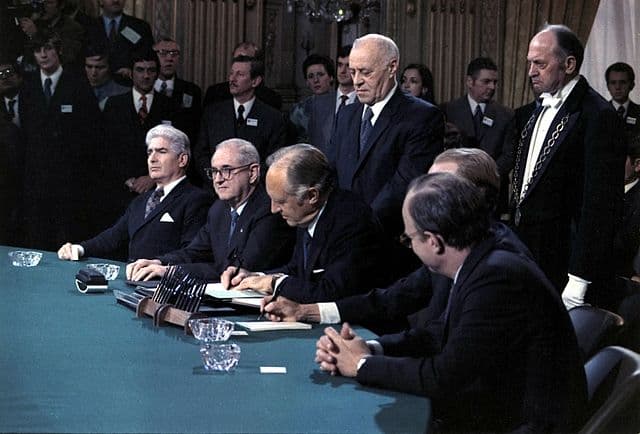Vietnam and Ukraine
Fifty years after America signed the Paris Peace Accords with Vietnam, the pact is a reminder that Congress is capable of abandoning an ally in the middle of a war.

The thing to remember on the anniversary of the signing of the Paris Peace Accords — a catastrophic compromise forced by America on the government of Free Vietnam — is that it could yet happen in respect of Ukraine. This time the pressure for a negotiated settlement is coming, at least in part, from the right. Senator Rand Paul, the libertarian-type Republican, just offered another warning against the war in Ukraine becoming “endless.”
So left or right, it is a possibility — slim at the moment, but history teaches to beware — that Congress will get tired of this war and end the support. Even if no GIs ever go to Ukraine. This is one of the great lessons of Vietnam. It wasn’t about saving our GIs there. American combat soldiers were long since withdrawn from Vietnam when Congress cut off military support for the Free Vietnamese forces.
The anti-war movement, it turned out, was less about saving American GIs than it was about ensuring a victory by the communist side. We don’t mean to suggest that there were no patriotic Americans in the peace camp. There were many. There were many who wanted peaceful coexistence with the Soviet Union in Europe, too. They, though, were like the peace movement that Alfred Hitchcock’s “Foreign Correspondent” dubbed “well-meaning amateurs.”
Vietnam was the first time that Congress formally abandoned an ally in the thick of combat. What was to prevent it? The peace movement had begun to get the upper hand early in the 1970s. The accords the anniversary of which is being marked today were inked in 1973. History doesn’t disclose her alternatives, and we will never know what might have happened had President Nixon not been forced from office without an impeachment, trial, or vote.
We do know that Nixon and Kissinger intended for the Paris accords to work. We also know that the North Vietnamese communists ignored the accords from the start. Soon the Pentagon Papers and Watergate brought down Nixon, who was forced to resign in the summer of 1974. We’d gone into Vietnam on, in the Tonkin Gulf Resolution, the flimsiest of war measures, though the Congress was nearly unanimous. Then it just crumpled.
In the end, it was basically the Republicans wanting to keep supplying the free Vietnamese — from artillery shells to aviation fuel. President Ford and Secretary of State Kissinger literally begged Congress to stick with it, but the Democrats refused, and in a series of votes between 1974 and 1975, withdrew their support. We’ll never forget watching the news of the key vote from the Foreign Correspondents’ Club in Hong Kong. Veteran reporters started racing for the door to get to Saigon.
As soon as Congress voted, the President of South Vietnam, Nguyen van Thieu, began withdrawing his forces from the Central Highlands. And by the end of April, Cambodia had fallen to the murderous Khmer Rouge, backed by Communist China, and Vietnam had fallen to a Soviet-backed North Vietnamese Army that had emerged from jungles — in some cases with tractor-trailers pulling Soviet-made surface to air missiles.
In Vietnam, Cambodia, and Laos, a population the size of Eastern Europe’s was cast into the dark night of communism. America’s template of half-declared wars was set. Next came Iraq, abandoned by the Obama-Biden administration, and then Afghanistan, surrendered to the Taliban by President Biden. This is what we think of as we mark today the signing of the Paris Peace Accords. The last war we won unambiguously was the Second World.
Which is something to remember as the fringes in Congress fret over the cost of Ukraine. In declaring World War II, Congress committed “all the resources of the country” — period. In Vietnam, there was no such commitment. The fretting started on the fringes in Congress, eventually forced the Nixon administration into the Paris Accords, and ended in our abandoning our ally in what will stand among America’s darkest days.

